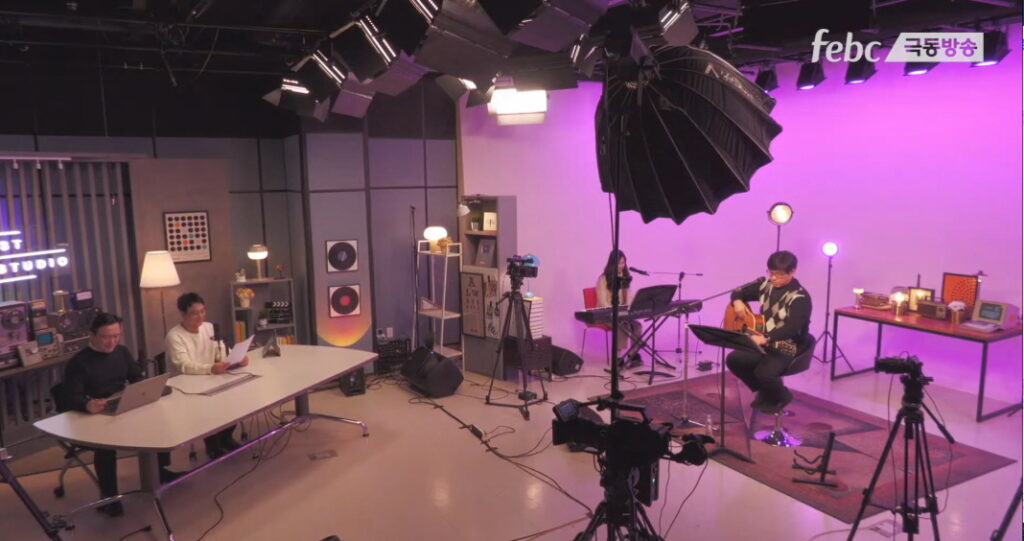Imposing sanctions on the program of the Korea Communications Commission goes against the spirit of the times in reducing regulations by refraining from interfering with broadcast content.
Does the content that a religious broadcasting station established in the spirit of Christianity criticizes the discrimination act with the basis of Biblical grounds violate the fairness and objectivity of the Broadcasting Act?
The Seoul Administrative Court ruled that even if it is a religious broadcast, FEBC must fairly provide diverse perspectives on social issues or matters where interests are sharply conflicting, and thus, for this reason, the sanctions imposed by the Korea Communications Commission cannot be considered unfair.
Against the above, the FEBC revealed that FEBC decided to appeal on March 6, arguing as a private radio broadcaster that conducts religious broadcasting that freedom of broadcasting aimed at diagnosing discrimination act from a religious perspective through a broadcast funded by donations from Christians must be widely recognized.
The Beginning of the Incident = On July 9, 2020 for about an hour from 6 PM, a talk program titled ‘Special Discussion and Emergency Diagnosis of Comprehensive Discrimination Act’ was held in a program ‘Happy Evening Fun Radio (행복한 저녁 즐거운 라디오)’ in which attorney Young-Gil CHO (조영길), the representative of National Education Recovery Teachers Association (Recoveredu, 전국교육회복교사연합) Jin-Yeong YUK and the representative of Right Military Human Rights Research Institut(바른군인권연구소) Yeong-Gil KIM, who are Christian experts, spoke about the discrimination act.
On that day, they pointed out the problems “when the discrimination act is enacted, not only can ordinary citizens who oppose homosexuality be labeled as criiminals and subject to criminal punishment, but the ordinary citizens can be subject to fines of tens of millions of won (₩) indenfinitely. When sexual assault occurs in the military, if the perpetrator claims to be homosexual, he/she will receive preferential treatment, and they may repeatedly impose enforcement fees on anti-homosexuality sermons and force the broadcasting companies that broadcast the sermons into bankruptcy.”
The Trial Decision = With regard thereto, the KCSC decided to take ‘Caution’ measures in accordance with Article 100 of Broadcasting Act saying that the FEBC violated fairness (Article 9) and objectivity (Article 14) of Regulations on broadcast review since on November 9 of that year, the speakers only conveyed their opposition to the discrimination act and broadcasted unclear contents as facts, contrary to the contents stipulated in the Act.
With regard thereto, the FEBC argued that the speakers conveyed their subjective opinions regarding the expected results if the discrimination act is implemented, and further the speakers did not distort the facts. Further, the FEBC argued that as monopolies and demands for fairness in broadcasting media are disappearing, the FEBC needs to meet listeners’ demands for a variety of programs, and it is illegal to restrict the freedom of religion and freedom of expression of speakers and listeners. However, as described above, the FEBC was ruled to lose.
Korea Communications Standards Commission questioned about the objectivity and the fairness, but what about the public responsibility and the ethics in broadcasting?
Problem of the Decision = The court argues that even if the FEBC is a religious broadcasting station, since the FEBC can also influence the general public depending on the topic and content of the broadcast program, opposite opinions should be presented to avoid bias or unbalanced view on the issue. Further, the court ruled that the broadcast program that received the ‘caution’ is not a main program (religious purpose) but a sub-program as it is a broadcast program about culture, and it is not a broadcasting area where autonomy in programming content is guaranteed.
However, the decision of the court can be seen as ignoring the broadcasting’s public responsibility (Article 7), the fairness (Article 9), the ethics (Article 25) and the respect for freedom of religion (Article 32) which are other articles of the Regulations on broadcast review that is applied as the ground basis for the legal sanction.
Article 7 of the Regulations on broadcast review states “Broadcasting should contribute to the diversification of society by actively covering diverse opinions and ideologies(방송은 다양한 의견과 사상을 적극적으로 다루어 사회의 다원화에 기여하여야 한다).” Further, Article 9 ⑤ states “Broadcasting must not discriminate in broadcast programming based on gender, age, occupation, religion, belief, class, region, race and so on. However, this does not apply if a broadcasting business operator that specializes in programming on religious missions broadcasts within the scope of its broadcasting field(방송은 성별·연령·직업·종교·신념·계층·지역·인종 등을 이유로 방송편성에 차별을 두어서는 아니된다. 다만, 종교의 선교에 관한 전문편성을 행하는 방송사업자가 그 방송분야의 범위안에서 방송을 하는 경우에는 그러하지 아니하다).” That states clearly state that religious broadcasting’s advocacy of religious positions cannot be considered an act of discrimination.
In addition, Article 25 ① of the Regulations on broadcast review states that broadcasting must contribute to the establishment of correct values and norms of the people and to the advancement of social ethics and public morality, and Article 25 ② of the Regulations on broadcast review states that broadcasting must respect the value of family and community, and this points out the ethics of broadcasting. Article 32 regulates that broadcasting must respect freedom of religion.
The FEBC was established in 1956 to spread the good news of salvation to the North, and since then the FEBC has been broadcasting missionary programs in five languages, including Korean, through religious broadcasting, and the FEBC has been broadcasting all liberal arts programs with contents consistent with the spirit of Christianity.
Management policy of the FEBC: “Spiritual salvation of all people through the spread of the gospel”
In addition, the FEBC presents “The purpose is to spread the gospel of Jesus Christ to the people of the North Korea where missionaries cannot be dispatched and the Republic of Korea to achieve spiritual salvation for all people and improve the spiritual life of believers” through its Internet homepage. The vision statement reveals that “FEBC continues and develops the proud tradition of spreading only the gospel, faces the changes and signs of the times and presents all solutions through the gospel, and fulfills its vision of preaching Jesus Christ to the world until the Second Coming of the Lord.” In other words, as a religious broadcasting station, the FEBC has clearly revealed that the FEBC not only broadcasts worship services such as praise and sermons, but also exists as a broadcaster that views public areas such as science, politics and economics from a Christian worldview.
Accordingly, in the program that has been sanctioned, the participants argued that by the discrimination act proposed by the National Assembly effectively recognizing homosexuality under the legal principle of prohibiting discrimination on the grounds of sexual orientation and gender identity, correct values and norms based on the Constitution and Family Law, which are the foundation of our society, may be disintegrated, social ethics may be disturbed, and the values of the family community may be broken. Further, in the program, the purpose of the legislation and the problems that may arise from the discrimination act were examined on the Biblical grounds. According to Article 36 of the current Constitution of South Korea, our family system is based on both genders’ equality, and the nation should guarantee the family system(헌법 36조, 혼인과 가족생활은 개인의 존엄과 양성(兩性)의 평등을 기초로 성립되고 유지되어야 하며, 국가는 이를 보장한다). Further, according to the family relations laws of the civil law, same-sex marriage, which can be permitted through the discrimination act, is an unconstitutional concept.
Therefore, the court’s decision that the content of the broadcast lost the objectivity and the fairness because the program was a conversation program and did not include counterarguments cannot avoid criticism that the court ignores the reason for the existence of religious broadcasting and further ignores the freedom of speech.
“We urge the prayers and interest of Korean churches and believers.”
FEBC’s response = The FEBC argues that there is a possibility of infringement of Freedom of Religion in the court forcing the FEBC to broadcast the content that conflicts with the doctrine and missionary direction of religious broadcasting because of the fairness with the reasoning of the court, and the FEBC argues that the court’s decision goes against the spirit of the times in which constitutional interference with broadcast contents is restricted as much as possible and the need for regulation is decreasing.
Accordingly, the FEBC plans to appeale to the Supreme Court in March with dissatisfaction with the Administrative Court’s ruling. At the same time, for the freedom of the religious broadcasting, the FEBC is planning to explain about the situation to Korean churches and believers, guide the signature movement, and urge active prayer and interest.
An official from the FEBC said “the FEBC, which was established for broadcasting missions, produces and broadcasts virtually all contents based on the spirit of Christianity,” and “reviewing the religious broadcasting with the same standards as general broadcasting is the same as not acknowledging the existence of religious broadcasting.” [Gospel Prayer News]
<Copyright©gpnews This article is allowed for those who pray for the world in God’s way. Please indicate source, gpnews, and those who use this article let our head office know. Please indicate the source when using the article> Contact us for reports and inquiries: gpnews@kakao.com





